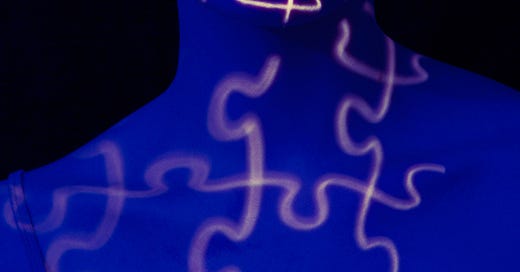Age and Prosper is a reader supported publication created for anyone looking for healthy longevity. If you enjoy it, please consider supporting it financially for $5 a month (and/or sharing it). Becoming a paying subscriber supports us in producing this newsletter and bringing you wisdom to help you live a longer and healthier life.
When we think of crossword puzzles, we tend to think of intellectual older people: grey haired, in their sixties+, and retired because it takes a long time to complete the puzzle. They are usually drinking a black cup of coffee with no cream in the morning sunlight with a newspaper that has been folded 4 times to the perfect rectangle framing of only the crossword puzzle. And they know the answers too abstract questions like “What is the study of the origin and evolution of the universe (13 letters): COSMOLOGY. We thought cosmology is where people went to hair and makeup school.
Crossword puzzles are the easiest and most accessible way of exercising your brain. Brain exercises benefit longevity by increasing brain plasticity, which is the biological process of strengthening the brain's ability to learn and remember. This is especially important for the aging population as it can help to reduce cognitive decline.
While writing this newsletter we learned that crossword puzzles books come in many different fun and simple themes such as on American history, cuisine, and even Halloween. You do not have to be frightened by crossword puzzles anymore.
Portrait by Tomsandersphoto.com
The crossword puzzle was invented in 1913 by Arthur Wynne, a journalist from Liverpool, England. He created the first crossword puzzle for the New York World newspaper, and it was an instant hit. It was originally called a "word-cross" puzzle, and it was the first of its kind. Wynne's puzzle was a diamond-shaped grid with clues for each word, and it quickly became a popular pastime. It was a simple yet challenging way to pass the time, and it has been a beloved activity ever since.
What are the benefits of doing crossword puzzles?
According to a Harvard study, doing crossword puzzles at least 4 times a week for 30 minutes will improve cognitive function.
Crossword puzzles can be a social activity by including others which is an extra bonus for longevity.
This Duke University study showed that crosswords beat computer games in slowing memory loss.
Crossword puzzles are easily accessible, you can pick up a crossword puzzle book at your local grocery store, print them free online, or find one in your daily newspaper (yes, some people still get daily printed newspapers).
You do not have to limit yourself to crossword puzzles, regular brain exercises, such as visual puzzles and problem-solving games, can help to improve cognitive functioning and contribute to a person's overall well-being.
Don’t let your brain fog be confused with an aging brain, it could be caused by overuse from too much time on your phone and computer or a possible food allergy such as gluten. Try a digital detox first to see if it improves your memory, we bet it will!
Until next week, age and prosper!





